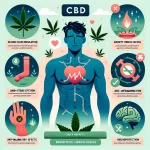In states that have legalized medicinal marijuana, CBD oil has surged to the top of the market, where you can now purchase CBD oils from the many U.S.-based CBD shops such as relaxation.co. Popular in the self-treatment of many issues such as anxiety, insomnia, inflammation and seizures, the non-intoxicating oil can be found in many forms, including gummies, chocolates, creams, coffee, hemp sticks and vape pens in CBD shops worldwide.
CBD oil is derived from the hemp plant, a cousin to marijuana, and is available in shops and places online like OrganicCBDNugs. Although CBD is the second most active ingredient (out of over 100), it does not cause a “high,” since the altered state from marijuana ingestion is caused by the first active ingredient, Tetrahydrocannabinol (THC).
To date, the only FDA-approved cannabis-derived product is Epidiolex, a prescription-only product that is used to treat seizures associated with Lennox-Gastaut syndrome or Dravet syndrome, two rare forms of childhood epilepsy, in patients two years of age and older.
In fact, regardless of the widespread belief that CBD oil is a wonder cure for all types of issues, treatment for epilepsy is the only use of the product that is backed up by significant scientific evidence, which is why the FDA voted unanimously to approve Epidiolex.
The second-most common use of CBD oil is the treatment of anxiety, and though there have been some clinical trials done with adults, the studies were much smaller than those done with epileptic children. Any other potential uses — including as an antidepressant and a sleep aid — have only been tested on animals. Any purported, fact-based medical aid a CBD product promises is basically just postulation spread by either manufacturers or fans.
Besides this one particular use, the FDA has yet to step in to regulate the mass production and distribution of other CBD products. It was only this past summer when they began discussing mass production and distribution of the product, and state policies surrounding the product are muddled.
As a result, the oil can easily be bought online without a medical marijuana card. And, due to the lack of regulations, manufacturers have free reign on how they choose to label and market their products.
Commonly, CBD is marketed and sold as a dietary supplement, often at sites like Somnio CBD, rather than a medication. This is a loophole that manufacturers use to mislabel their products, since, currently, the FDA does not regulate the safety and purity of dietary supplements.
Additionally, a 2017 study found that 7 out of 10 CBD products mislabeled the amount of marijuana extract contained in the product. About 43% of the products contained less than they stated, and about 26% contained more.
The study found that just about 1 in 5 products labeled as CBD also contained some level of THC, the intoxicating marijuana ingredient. This is a problem because, for some, THC can increase anxiety levels and can actually make seizures worse — and these are two of the most common ailments CBD products are marketed to help. So, the mislabeling is dangerous.
In general, side effects of CBD oil include nausea, fatigue and irritability. It can also “increase the level in your blood of the blood thinner coumadin, and it can raise levels of certain other medications in your blood.” Since there is limited research into the extent of the effects of the oil, pairing it with other medications could be unsafe. There has also yet to be a scientific conclusion on the most effective dosage of CBD for any medical condition.
Without sufficient scientific evidence found through human studies, there is no way to tell if CBD has a positive causation — or even correlation — in aiding with ailments such as anxiety, insomnia and chronic pain. Until research is published, be wary of any products you buy and any potential risks you are taking.
















